I. Guerilla Bridge Building
In the daily cycle of local, national, and international news, opportunities to advance the body politic through new connections and ongoing collaboration arise in unexpected ways. Some are nascent and alchemical, small moments that emerge like mushrooms after a hard rain. Others have hazier possibilities. We see the contours of something down the road but that “something� is indistinct and will require attention, planning, and foresight. A few of those possibilities will spring alert and full-blown, ready for an instantly opportunistic response. To take advantage of them, we need to become “guerilla� bridge-builders who can deploy quickly and effectively when the moment is right
 AK-47 Assault Rife. It is a preferred weapons for guerilla groups: simple, inexpensive, and easy to manufacture.
AK-47 Assault Rife. It is a preferred weapons for guerilla groups: simple, inexpensive, and easy to manufacture. Credit: Wikimedia Commons
Guerilla warfare is unconventional. Instead of relying on large, slow moving armies and doctrines of overwhelming force, guerillas depend on invisibility, highly portable weapons, quick ambushes, booby traps, and hundreds of pressuring tactics that achieve practical offensive or defensive results. “Guerilla� tactics have been adapted and applied in many non-military areas. Today, we have guerilla marketing, guerilla job finding, guerilla news networks, guerilla bloggers, and guerilla mutual fund investors. Why not a new art and science of guerilla conflict management applied to day-to-day politics? [i] There are plenty of lessons to learn from.
On February 6, 1905, Russia and Japan’s simmering competition for control of Manchuria and Korea came to a head. Heihachiro Togo launched a surprise torpedo attack on Russian ships at Port Arthur on the Liaodong Peninsula in Manchuria, a precursor of events to come at Pearl Harbor three decades later. The battle for Port Arthur was the opening salvo in the Russo-Japan war, a brief, bloody dispute that became the first modern confrontation between Asian and European superpowers and a prelude to coming world wars. In a later phase of that war, 750,000 Japanese and Russian soldiers would engage in a 3-week battle that left 100,000 dead or injured.
Conflict between Russia and Japan was not the only big event that year. A hurricane roared ashore in Tahiti and killed 10,000 people. Drought, disease, and famine haunted Central Africa. A militant Irish group called Sinn Fein launched an armed struggle against British rule that would last much of the century. A dozen blacks and whites were killed in an Atlanta race riot even as W.E.B. Dubois and other black leaders organized the Niagara Movement. Idaho Governor Frank Steunenberg was assassinated and three members of the Western Federation of Miners were accused of murder. In Russia, a sailor’s revolt was put down and in Lithuania Jews in dozens of small villages were wiped out in pogroms. These were tragedies, but they each created longer-term opportunities: the rebuilding of an island nation; a new and unified Ireland; an American civil rights movement; new and fairer labor laws; a modern Russia; a Diaspora and the creation of a Jewish homeland.
Maybe life is always like this. Check today’s newspaper and you will find a serial killer preying on young women in Juarez, village massacres in the Sudan, and suicide bombings in the Gaza. Tomorrow it will be sectarian killings in Iraq, tropical cyclones in the Pacific, and forest fires across the Rocky Mountain States. Collectively, the news reminds us of the pathos, tragedy, and misery that most people must confront everyday. Then, when you are most convinced that life’s cup is half-full but filled with poison, events occur that restore our belief in possibility. Today’s news brings the story of two Neolithic era skeletons found buried together in a tender embrace. Touched by what they see, the archeologists have dubbed them “Romeo and Juliet.�
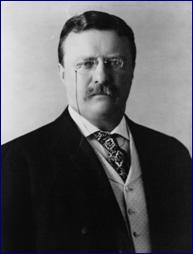 Theodore Roosevelt, President of the United States, 1901-1909.
Theodore Roosevelt, President of the United States, 1901-1909.Credit: Wikimedia Commons.
In their brief but furious war, Russia suffered embarrassing defeats. Faced with escalating unrest from the Bolsheviks at home, they sought a graceful exit as did a financially exhausted and militarily overextended Japan. Enter Teddy Roosevelt. Impetuous, tough, and far more accustomed to wielding authority than influencing it. Roosevelt quietly offered the services of the U.S. as a go-between. The U.S., with no immediate stake in the conflict, was a reasonable choice. Roosevelt could use his good offices to explore a settlement that might end the dispute and save face for the Japanese and Russians even while bootstrapping his country onto the world stage.
After preliminary arrangements were put in place, Roosevelt invited delegations from both countries to the U.S. and asked them join him for lunch on his yacht at Oyster Bay. Then he had them delivered to the meeting on separate American warships. During the ensuing roundtable discussions, he treated both sides with dignity, composure, and even-handedness. More than a passive host, Roosevelt stayed quietly but firmly involved in the proceedings. He lowered each side’s expectations, remained uncharacteristically patient with the usual diplomatic maneuvering, and issued personal pleas to the rulers of both countries to end the conflict. It worked and the peace was secured.
The Treaty of Portsmouth solved certain problems and created others, continuing proof that every good solution has unforeseeable implications and unintended revenge effects. Signed in September 1905, the treaty marked the emergence of Japan as a superpower but, in hindsight, it also launched a chain of events that would prove to be at issue in World War II. For his interventions, Teddy Roosevelt was awarded the first Nobel Prize ever made to a politician for peacemaking.[ii]
Not every great impasse-breaking opportunity succeeds and guerilla bridge building can fail. In the Great Depression era, Attorney General Robert Menzies, soon to become one of Australia’s longest running and most respected Prime Ministers, waded into a vitriolic labor strike at Port Kembla. Members of the Waterside Workers' Federation had refused to load scrap iron bound for Japan. The 1939 strike was paralyzing Australia’s barely recovering economy and Menzies thought he could sort it out. He arranged a meeting with union leaders in the industrial city of Wollongong south of Sydney to try to settle the controversy and was hurriedly and ingloriously escorted out of town amidst mounting violence, forever more to bear the moniker “Pig Iron Bob.�
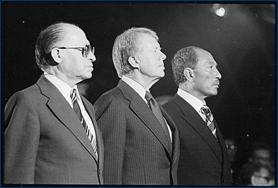 Menachem Begin, Jimmy Carter, and Anwar Sadat at Camp David, 1978.
Menachem Begin, Jimmy Carter, and Anwar Sadat at Camp David, 1978.Credit: Wikimedia Commons
President Bill Clinton, trying to emulate Teddy Roosevelt’s turn of the century success and Jimmy Carter’s work with Egyptian President Anwar Sadat and Israeli Prime Minister Menachem Begin in 1978, sought to again use Camp David as a neutral ground to break the continuing gridlock surrounding Israel and Palestine.Clinton, along with his Secretary of State, Madeleine Albright, spent days locked in discussions with leaders Arafat and Barak. In the end, the talks came close but ultimately failed to accomplish the much expected breakthrough.
Whether done by presidents, school principals, or favorite uncles and aunts, diplomatic efforts in the center of the cyclone benefit from persistence, empathy, and insight into what hungers people. They also require, in the words of William Simkin, “The patience of Job, the sincerity and bulldog qualities of the English, the wit of the Irish, the physical endurance of a marathon runner, the broken field running of a halfback, the guile of Machiavelli, the personality probing characteristics of a good psychiatrist, the confidence-retaining characteristics of a mute, the wisdom of Solomon, and the hide of a rhinoceros.� [iii] Good bladder control and the ability to catch power naps with your eyes open may also help. Even with all these things, luck and timing play a large role.
1 Safety
“Every conflict breaks your heart.� Kenneth Cloke
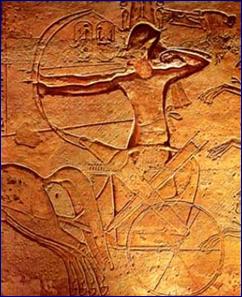 The track record: war punctuated by peace or peace punctuated by war?
The track record: war punctuated by peace or peace punctuated by war?Credit: Wikimedia Commons

2 Solutions
“Whatever you can do, begin it. Boldness has genius, power, and magic in it. Begin it now.� Johann Wolfgang von Goethe
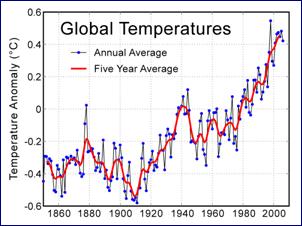 Global warming S-curve: what happens next?
Global warming S-curve: what happens next?Credit: Wikimedia Commons.

3 Involvement
“Those who danced were thought to be quite insane by those who could not hear the music.� Angela Monet
 The Age of Hierarchy is coming to a close. People want more participation.
The Age of Hierarchy is coming to a close. People want more participation.Credit: Wikimedia Commons
Hierarchy isn’t dead, but in fits and starts it is flattening. It isn’t just young people who are naturally rebellious, cranky, and counter-dependent. Titles, status, and the trappings of office are increasingly suspect, a reflection of larger things that are afoot: a deep impulse towards meaningful consultation, an insistence on more participation in the distribution of power, a desire to impact the decisions that affect us. People are hungry for contribution, association, and becoming a vital part of those larger forces that affect them. The trend won’t stop anytime soon. Distrust of blunt authority will accelerate. The rise of more laws and rights, the information revolution, mass travel, exposure to new ideas, an increasingly educated public, the growth of market economies, and a deep desire to access them will accelerate the demand for participation. You can resist these trends, but you will ultimately lose. If you play a role in the politics of governance in the private, public, or civil sectors, you might take another tack altogether. Consider championing these trends. The particulars are negotiable but you must welcome other political guerillas to be with you on the path.

4 Continuity
“Make sure that the things you do keep us alive.� Graham Nash
 A Wasp, Aleiodes indiscretus, parasitizing a Gypsy Moth Caterpillar.
A Wasp, Aleiodes indiscretus, parasitizing a Gypsy Moth Caterpillar.Credit: Wikimedia Commons.

5 Amity
“You may not be interested in war, but war is interested in you.� Leon Trotsky
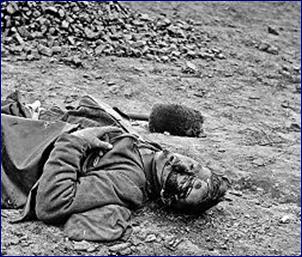 Dead soldier at Petersburg, Virginia, April 1865.
Dead soldier at Petersburg, Virginia, April 1865.Credit: Wikimedia Commons.

6 Redemption
“Revenge is a dish best served cold.� Pierre Ambroise Francois Choderios de LaClos
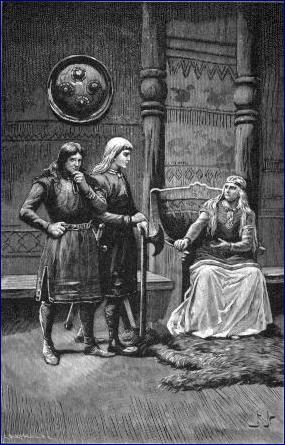 Gudrun agitating her sons to avenge their sister.
Gudrun agitating her sons to avenge their sister.Credit: Wikimedia Commons.

7 Meaning
“We live in a deeply paradoxical age, and it will take serious mental ability to navigate the years to come. Capable and imaginative people, both inside and outside barbarity, are beginning to realize this. And for every person who does, civilization gains a better chance of survival.� Bruce Sterling
The basic law of inflation is this: when there is more and more of everything, it all means less and less. In a world of greater and greater opportunity, of more and more material things, meaning must be discovered or created in small things. In conflict,
 1917 Issue U.S. Dollar.
1917 Issue U.S. Dollar.Credit: Wikimedia Commons.

8 Politics Re-Invented
“Mine is an art (and a politics) in which optimism is kept in check and nihilism kept at bay.� William Kentridge
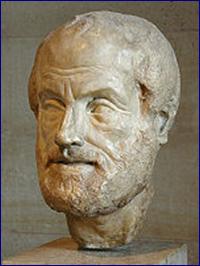 Aristotle believed that an ethical life must be lived by participating in politics.
Aristotle believed that an ethical life must be lived by participating in politics.Credit: Wikimedia Commons.

9 Children
“When I was a child in Philadelphia, my father told me that I didn't need to memorize the contents of the Encyclopedia Britannica; I just needed to know how to find what is in it.� Richard Saul Wurman
 "Mother and Child." Credit: NARA/Harmon Foundation.
"Mother and Child." Credit: NARA/Harmon Foundation.
10 Justice
“Dwell in possibility.� Emily Dickenson
 “Subway on the Brooklyn Bridge, 1974.�
“Subway on the Brooklyn Bridge, 1974.�Credit: Wikimedia Commons.

- What are the major issues facing the people in your community, company, church, or family and what kinds of conflicts are those issues spawning?
- What role do you play in those conflicts? What role would you like to play?
- How effective are you in managing those conflicts and what is your measure of success?
- Name a time when you brought people together to solve a big problem, create a new initiative, or forge a vision.
- In your world, what are people hungry for and why?
- Describe three specific ways you would like to improve politics if you could pull them off.
Endnotes
[i] See “The Guerrilla Mediator: The Use of Warfare Strategies in the Management of Conflict,� in The Creative Problem Solvers’ Handbook for Negotiators and Mediators, ed. Jack Cooley, ABA Section on Dispute Resolution, 2005
[ii] See Edmund Morris’ Theodore Rex (2001).
[iii] I heard this from William Simkin, former director of the Federal Mediation and Conciliation Service in a speech given to the Society for Professionals in Dispute Resolution in 1981 in Toronto. Simkin is also the author of Mediation and the Dynamics of Collective Bargaining, BNA Books, 1971.
[iv] See “The Prophet of Climate Change: James Lovelock� by Jeff Goodell, Rolling Stone, Oct 17, 2007 at http://www.rollingstone.com/
[v] I am indebted to Doug Thompson of The Keystone Center for this story. See also Collapse by Jared Diamond (2005).
[vi] This metaphor –- building suspension bridges between peace and justice -– comes from Carrie Menkel-Meadow, Professor of Law at Georgetown University.
|
|
This site managed with Dynamic Website Technology
from Mediate.com Products and Services |
